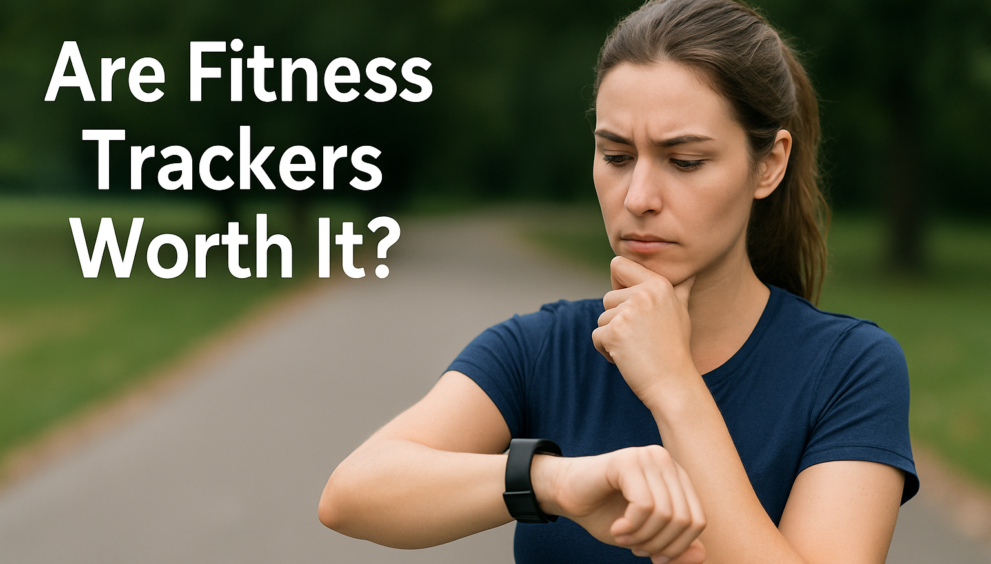Are Fitness Trackers Worth It? Unveiling the Truth Behind the Hype

The question arises in today’s health-conscious society: Are fitness trackers worth it? With a plethora of devices like smartwatches, bands, and rings flooding the market, consumers are eager to understand their value. This article delves deep into the benefits, limitations, and overall worth of fitness trackers. PMC
What Are Fitness Trackers?
Are fitness trackers worth it? To answer this, we must first understand what they are. Fitness trackers are wearable devices designed to monitor various health metrics, including steps taken, heart rate, sleep patterns, and more. They come in various forms, such as watches, bands, and rings, catering to different user preferences. Live Science
Are Fitness Trackers Worth It? Exploring Their Impact on Health and Fitness
Are fitness trackers worth it? For many, the answer is a resounding yes, primarily due to the myriad benefits they offer:
- Activity Monitoring: Track daily steps, distance covered, and calories burned.
- Heart Rate Monitoring: Keep tabs on your heart rate during various activities.
- Sleep Tracking: Analyze sleep patterns to improve rest quality.
- Goal Setting: Set and achieve fitness goals with real-time feedback.
- Motivation: Stay motivated through progress tracking and reminders.
Encouraging Physical Activity
A comprehensive analysis published in The BMJ reviewed 121 studies involving nearly 17,000 adults. The findings revealed that individuals using fitness trackers increased their daily steps by an average of 1,235 and engaged in 49 additional minutes of moderate-to-vigorous physical activity each week. This suggests that fitness trackers can effectively motivate users to incorporate more movement into their daily routines. Harvard Health
Enhancing Sleep Quality
Sleep is a critical component of health, and many fitness trackers offer features to monitor sleep patterns. By analyzing sleep duration and quality, users can identify areas for improvement. For instance, some devices provide insights into sleep stages, helping users understand their sleep cycles and make necessary adjustments for better rest. History Tools
Promoting Long-Term Health Benefits
Regular use of fitness trackers has been associated with various health benefits, including weight loss and improved cardiovascular health. A study published in The Lancet Digital Health found that individuals using fitness trackers experienced modest weight loss and reductions in blood pressure and cholesterol levels. These findings underscore the potential of fitness trackers to support long-term health goals. Harvard Health
Are Fitness Trackers Worth It? Addressing Common Concerns
Are fitness trackers worth it? While they offer numerous benefits, it’s essential to consider their limitations:
- Accuracy Issues: Not all trackers provide 100% accurate data, especially concerning heart rate and calorie expenditure.
- Data Overload: The abundance of data can be overwhelming for some users.
- Privacy Concerns: Sharing personal health data with third-party apps may raise privacy issues.
- Dependency: Over-reliance on trackers can lead to anxiety or obsession over metrics.
Accuracy Limitations
Although fitness trackers have improved over time, they may not always provide precise measurements. Factors such as device placement and user movement can affect data accuracy. For example, heart rate readings may be less reliable during high-intensity workouts. It’s important to use the data as a general guide rather than an exact measurement. getfit7.com
Potential for Data Overload
The abundance of data provided by fitness trackers can be overwhelming for some users. Constant monitoring of various health metrics may lead to stress or anxiety. It’s crucial to focus on meaningful trends and avoid becoming overly fixated on specific numbers.
Privacy Considerations
Fitness trackers collect sensitive health data, raising concerns about data privacy and security. Users should review privacy policies and understand how their information is stored and shared. Opting for devices with robust security measures can help mitigate these concerns.
Personal Experience: A Fitness Tracker Enthusiast’s Perspective
Are fitness trackers worth it? As a tech enthusiast, I find immense value in using fitness trackers. I regularly record my runs, steps, and sleep cycles. Wearing my tracker almost 24 hours a day, even during sleep, has become second nature. Initially, it felt uncomfortable during sleep, but over time, I adapted.
Currently, I use the Zero Royale, a combination of a smartwatch and fitness tracker. While its tracking capabilities are decent, they don’t match up to the accuracy of the Apple Watch. I’ve also tried other trackers like Google’s Fitbit and Xiaomi’s Band, which offer better tracking but lack the comprehensive features of a smartwatch. For someone seeking a complete package, a device that combines both functionalities is ideal.
Comparative Analysis of Popular Fitness Trackers
Are fitness trackers worth it? To provide a clearer picture, here’s a comparison of some popular fitness trackers:
| Device | Form Factor | Key Features | Pros | Cons |
| Apple Watch | Smartwatch | Heart rate, ECG, GPS, sleep tracking | High accuracy, seamless integration | Expensive, shorter battery life |
| Fitbit Charge | Band | Steps, heart rate, and sleep tracking | Affordable, user-friendly | Limited smartwatch features |
| Xiaomi Mi Band | Band | Steps, heart rate, and sleep tracking | Budget-friendly, long battery life | Less accurate than premium devices |
| Zero Royale | Smartwatch | Combined features | All-in-one solution | Tracking accuracy could be improved |
Accuracy of Fitness Trackers: What Research Says
Are fitness trackers worth it? Accuracy is a crucial factor. Studies have shown that while fitness trackers are generally reliable for tracking steps and heart rate, they may not be as accurate for other metrics. For instance, a Stanford University study found that while heart rate measurements were within 5% accuracy, calorie expenditure estimates were off by up to 27% on average. Science Daily
Another study highlighted that devices like the Apple Watch Series 7 had the highest percentage of readings falling within the accuracy range of a clinical-grade oximeter, while others like the Garmin Venu 2s had a higher percentage of underestimated readings.
Insights from Stanford University, researchers evaluated seven commercially available wrist-worn fitness devices, including popular models like the Apple Watch, Fitbit Surge, and Samsung Gear S2. The primary objective was to assess the accuracy of these devices in measuring heart rate and estimating energy expenditure (calories burned).
The findings revealed that while heart rate measurements were relatively accurate, with a median error rate of less than 5%, the estimation of energy expenditure was significantly less reliable. The error rates for calorie burn estimates ranged from 27% to 93%, indicating substantial discrepancies between the devices’ readings and actual energy expenditure.
These results suggest that while fitness trackers can be dependable tools for monitoring heart rate, their calorie-counting features may not be as trustworthy. Therefore, users should interpret calorie burn data cautiously and consider supplementing it with other methods for tracking energy expenditure.
Are fitness trackers worth it? This study underscores the importance of understanding the capabilities and limitations of fitness trackers. While they offer valuable insights into certain health metrics, relying solely on their data for comprehensive health assessments may not be advisable.
Who Should Consider Using a Fitness Tracker?
Are fitness trackers worth it? They are particularly beneficial for:
- Fitness Enthusiasts: Those who regularly engage in workouts, runs, or outdoor activities.
- Health-Conscious Individuals: People aiming to monitor and improve their health metrics.
- Tech Lovers: Individuals who enjoy integrating technology into their daily routines.
However, they might not be suitable for everyone. Some users may find them unnecessary or even intrusive.
Are Fitness Trackers Worth It? Final Thoughts
Are fitness trackers worth it? For many individuals, the answer is yes. These devices offer valuable insights into physical activity, sleep patterns, and overall health, serving as tools to promote healthier lifestyles. However, it’s essential to approach their use mindfully, considering potential limitations and ensuring they align with personal goals and preferences. Latest news & breaking headlines
Frequently Asked Questions (FAQ’s)
Q1. Are fitness trackers accurate?
Yes, but with limitations. Fitness trackers are generally reliable for monitoring steps and heart rate. However, their calorie burn estimates can be significantly off. For instance, a Stanford study found that while heart rate measurements were within 5% accuracy, calorie estimates varied widely.
Q2. Are fitness tracker calorie estimates worth it?
They provide a rough estimate. Fitness trackers calculate calories burned using algorithms based on movement and personal data. While useful for general trends, they shouldn’t be solely relied upon for precise calorie tracking.
Q3. Do doctors recommend fitness trackers?
Yes, for general health monitoring. Doctors find fitness trackers helpful for encouraging physical activity and monitoring basic health metrics. However, they advise using them as supplementary tools rather than primary diagnostic devices.
Q4. Should I track my steps?
Yes, if it motivates you. Tracking steps can encourage more movement and help set activity goals. Studies have shown that individuals who monitor their steps tend to increase their physical activity levels.
Q5. Are fitness trackers safe?
Generally, yes. Fitness trackers are safe for most users. However, some individuals may experience skin irritation or become overly fixated on the data, leading to anxiety.
Q6. What are the disadvantages of fitness trackers?
- Accuracy issues: Not always precise in measuring certain metrics.
- Potential for obsession: Over-reliance can lead to anxiety or compulsive behavior.
- Privacy concerns: Data collected may be vulnerable to breaches.
- Battery life: Frequent charging may be necessary
It’s essential to use fitness trackers as tools, not as definitive health authorities.
Q7. Which fitness tracker is the best?
- Fitbit Charge 6: Great for beginners, offering comprehensive tracking features.
- Apple Watch Series 9: Ideal for iPhone users seeking advanced features and seamless integration.
- Garmin Venu 3: Best for serious athletes, providing in-depth metrics and long battery life.
Q8. Is a fitness tracker better than a smartwatch?
It depends on your needs. Fitness trackers are typically more affordable and have longer battery life, focusing on health metrics. Smartwatches offer a broader range of features, including apps, notifications, and more advanced health tracking.
Q9. How accurate are fitness tracking watches?
Moderately accurate. While they provide good estimates for steps and heart rate, other metrics like calorie burn can be less reliable. Accuracy can vary based on the device and how it’s worn.






